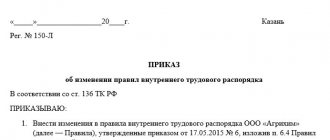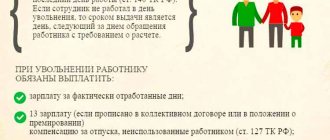Employer's obligations to pay wages
Every large enterprise has a collective agreement. One of the subjects of consideration of this agreement between the labor community and the administration is everything related to wages, namely:
- payment procedure;
- name of the bank or cash advance;
- payment terms (for example, employees should receive the first part by the 16th, and the second by the 31st).
If the situation is not regulated in the collective agreement, then the employer must stipulate the procedure for paying remuneration in an individual employment agreement with each employee. It is important to indicate specific deadlines.
It is important to know! According to the norms of Part 6 of Article 136 of the Labor Code of the Russian Federation, the maximum period between the transfer of the first and second parts of a salary to a citizen cannot exceed 15 days.
According to Article 133 of the Labor Code of the Russian Federation, an important responsibility of the management or owner of the company is to pay remuneration for labor in an amount not lower than the minimum guaranteed by law. In addition, according to the provisions of the resolution of the USSR Council of Ministers No. 566 of May 23, 1957, the amount of the advance (1st part of the salary) cannot be less than the tariff rate for the time actually worked at the time of payment. An increase in the advance amount is allowed, a decrease is strictly prohibited.
So, the main responsibilities of an enterprise in paying employees are as follows:
- compliance with social standards;
- conducting calculations at least 2 times a month;
- compliance with established deadlines so that debt does not arise.
Salary payment terms
According to the norms of the Labor Code of the Russian Federation, earned funds must be transferred at a certain frequency.
Salaries must be transferred at least twice a month. Moreover, the break between accruals should not exceed fifteen days. That is, once every fifteen days a person is required to transfer money. For example, if an advance is paid on the second day of each month, and the rest of the income is paid on the fifteenth, then this will be a violation of legal requirements, since the next advance will be transferred later than fifteen days.
The general rules determine the minimum frequency of payments. However, any manager has the opportunity to pay the employee’s work with greater frequency.
This should be enshrined in the company’s internal rules, and also indicated in the content of the working agreement.
Delay in due payments to employees
Below we will consider what types of liability an employer may incur, as well as how the scope of rights of employees who do not receive wages changes in this situation.
Responsibility measures
If we study the negative consequences that can occur for an employer for violating the deadlines for paying wages, we can give clear advice to enterprise managers: it is impossible to delay wages.
Financial liability is regulated by the provisions of Art. 236 Labor Code of the Russian Federation. For each day of delay, a penalty is charged in the amount of 1/300 of the Central Bank refinancing rate multiplied by the amount of the debt. Perhaps the penalty will not be large, but on the scale of a large enterprise, unforeseen expenses will not be small.
According to the norms of Part 1 of Article 5.27 of the Code of Administrative Offences, the following administrative liability is provided for the above offenses:
- managers and entrepreneurs – a fine of 1,000 to 5,000 rubles;
- Legal entity - sanctions in the amount of 30,000-50,000 rubles.
If the situation with delays repeats, the sanctions will range from 10,000 to 20,000 and from 50,000 to 70,000 rubles, respectively, while officials may be dismissed without the right to occupy leadership positions for a period of 1 to 3 years.
Criminal liability can be used in accordance with the provisions of Art. 145.1 of the Criminal Code of the Russian Federation. If the obligations to pay people what they earn are completely ignored, the following measures may be applied to the employer’s management:
- a fine in the amount of 100,000 to 500,000 rubles;
- salary of the culprit for 3 years;
- forced labor for a period of up to 36 months;
- deprivation of will for a similar period.
In case of partial non-payment for a period of 3 or more months, less stringent, but still serious sanctions are applied:
- a fine of up to 120,000 rubles;
- similar to the above measures, but the maximum term of all types of punishment cannot exceed 1 year.
Attention! If the delay in payment leads to serious consequences (for example, the suicide of an employee), then the employer may be held liable in the form of imprisonment for up to 5 years.
If the bank is at fault
When transferring money to employee cards issued as part of a salary project, problems do not arise, because the company account and the project are usually opened in the same bank. As practice shows, employees receive money for their plastic boats on the day of transfer. Accountants of a conscientious employer carefully monitor the timing of the formation of payment orders for salaries.
Recently, the State Duma decided to amend the Labor Code of the Russian Federation, according to which the employee has the right to determine the bank where he will receive money. In the old version of the article there was no such provision. And this is where a problem can arise, because people can choose a huge number of institutions, but the company’s current account is opened in only one bank. According to the comments of accountants, the transfer of money from one institution to another through the Central Bank system can be carried out over several working days, and the funds will be credited to the employee’s card after the date specified in the collective or employment agreement.
In this case, the employer will not bear absolutely any liability due to the following reasons:
- He is unable to regulate the period for transferring funds between financial institutions.
- The manager sent the salary slip to the bank, so the remuneration in non-cash form is considered paid on time.
Legal actions of employees
Workers who do not receive wages have the right to certain actions aimed at protecting and asserting their rights. The list of permitted procedures is clearly stated in Article 142 of the Labor Code of the Russian Federation.
Suspension of work
Company employees have the right to stop work if the period of non-payment of wages exceeds 15 days. The minimum downtime period is not regulated, because people have such a right until the debt is fully repaid.
Article 142 of the Labor Code of the Russian Federation establishes that no one has the right not to fulfill their duties without written notification to management. In this case, you must write an individual or collective statement indicating the following information:
- addressee (addressed to the general director, head of the board, etc.);
- from whom is the notification (full name of all submitters, structural unit);
- the date and reason why the employee(s) will not perform the work required by the job description;
- date of compilation and signature of all colleagues.
It makes no sense to provide a sample, since the document is drawn up in free form and, according to reviews from citizens, it is not difficult to draw up.
It is important to know! The law retains the calculation of average earnings for each day of non-payment, that is, the employer’s management will not apply any absenteeism or other sanctions to subordinates. In the case of entering “zeros” on the work time sheet and subsequent dismissal under the “article”, the citizen will be able to go to court and defend his legal right to work.
Emergencies
The provisions of Article 142 of the Labor Code establish that not all categories of workers and not in all situations have the right not to go to work in the event of a delay in the payment of wages. Suspension of work activity is not allowed:
- During a military or other state of emergency (even on the territory of a separate republic). Due to the peculiarity of the situation, government bodies and the army receive super powers, including those of an expropriation nature, and therefore can seize money from an enterprise or individual entrepreneur. Employees do not have the right to strike, but must continue to perform their work duties.
- For employees of the Armed Forces of the Russian Federation and other legal military formations. Sabotage among employees of structures may lead to a weakening of the security of the state and, accordingly, will provide an opportunity for countries hostile to the Russian Federation to attack.
- For government employees. As a rule, delays in this area are extremely rare and most often due to the fault of banking institutions, so there is no real possibility of strikes by civil servants.
- In organizations that service hazardous industries and equipment that operates constantly (for example, in foundries).
- At utilities and other enterprises providing services to the population (energy, gas and water supply, garbage collection, postal and telephone communications, emergency medical care). In essence, we are talking about strategic life support facilities.
If employees of the above enterprises try to go on strike, they may be subject to dismissal for absenteeism.
Resumption of work
Art. 142 of the Labor Code of the Russian Federation (clause 3) provides that an employee must appear at his workplace the next day after receiving notification from the employer of his readiness to pay the debt. This notice is made exclusively in writing and can be served as follows:
- directly on the premises of the enterprise:
- by mail (sent by registered mail with notification);
- personally at your place of residence;
- by email (if indicated in the employee’s personal file).
Attention! Failure of a citizen to appear on time serves as grounds for dismissal for absenteeism. The employer should not be allowed to give such a reason
Partial debt repayment
Many people faced with the problem of non-payment of wages have a logical question: what to do if only part of the salary debt is repaid. In this case, the employee has every right not to go to work due to the following reasons:
- The employer's debt to him still remains; payment has not been made in full.
- The notice of suspension of work indicated that the work process would be resumed only after the debt was completely eliminated.
If the downtime is formalized correctly according to the Labor Code (Article 142), then there will be no negative consequences for the employee.
Comments on Article 142 of the Labor Code of the Russian Federation, judicial practice of application
Paragraph 57 of the Resolution of the Plenum of the Supreme Court of the Russian Federation dated March 17, 2004 N 2 “On the application by the courts of the Russian Federation of the Labor Code of the Russian Federation” contains the following explanations:
An employee’s right to suspend work also arises in the event of a delay in payment of wages in the absence of the employer’s fault.
When resolving disputes related to late payment of wages, courts should keep in mind that by virtue of Article 142 of the Code, an employee has the right to suspend work (except for the cases listed in part two of Article 142 of the Labor Code of the Russian Federation), provided that the delay in payment of wages payment was more than 15 days and the employee notified the employer in writing of the suspension of work. It is necessary to take into account that, based on this norm, suspension of work is allowed not only in cases where a delay in payment of wages for a period of more than 15 days was due to the fault of the employer, but also in the absence of such.
Deadline for payment of wages during forced absence of an employee
On the day the employee is reinstated in his previous position, the employer is obliged to pay him wages for the entire period of forced absence. In case of non-payment, the employee notifies the employer of the suspension of work.
The Supreme Court of the Russian Federation on the right of an employee to suspend work until payment of earnings for the period of forced absence
Clause 6 of the Review of Legislation and Judicial Practice of the Supreme Court of the Russian Federation for the second quarter of 2010 (approved by the Resolution of the Presidium of the Supreme Court of the Russian Federation dated September 15, 2010) contains the following explanations:
The employer’s obligation to accrue and pay wages to an employee reinstated by court decision for the period of forced absence occurs simultaneously with the employer’s cancellation of the dismissal order and his reinstatement in his previous position.
...In accordance with Art. 142 of the Labor Code, in the event of a delay in payment of wages for a period of more than 15 days, the employee has the right, by notifying the employer in writing, to suspend work for the entire period until the delayed amount is paid.
An employee who was absent from the workplace during his working hours during the period of suspension of work is obliged to return to work no later than the next working day after receiving written notification from the employer of his readiness to pay the delayed wages on the day the employee returns to work.
According to Art. 129 of the Labor Code, wages are remuneration for work, as well as compensation and incentive payments.
In accordance with Art. 234 of the Labor Code, the employer is obliged to compensate the employee for the earnings he did not receive in all cases of illegal deprivation of his opportunity to work.
From the content of this article it follows that the legislator, obliging the employer to compensate the employee for lost earnings, restores the violated right of the employee to receive payment for work.
By virtue of paragraph 1 of Art. 106 of the Law of the Russian Federation of October 2, 2007 N 229-FZ “On Enforcement Proceedings”, the requirement contained in the executive document for the reinstatement of an illegally dismissed or transferred employee is considered to be actually fulfilled if the claimant is allowed to perform previous job duties and the order is canceled ( order) on the dismissal or transfer of the claimant.
...Based on the totality of the provisions of Art. 106 of the Law of the Russian Federation “On Enforcement Proceedings”, Art. 129, 234 Labor Code, Decree of the Government of the Russian Federation of April 16, 2003 N 225 “On work books”, the meaning of the reinstatement procedure is precisely to cancel the legal consequences of dismissal by canceling the dismissal order (and not by issuing an order for reinstatement after court decision on reinstatement). Consequently, the employer’s obligation to pay wages for the period of forced absence occurs simultaneously with the cancellation of the dismissal order and the restoration of the employee to his previous position, being an integral part of the process of reinstatement at work.
...The court's decision to reinstate her at work is subject to immediate execution (Article 396 of the Labor Code), and therefore the court's conclusion that the defendant lawfully did not pay the plaintiff money before the court decision entered into legal force is incorrect.
The “Review of Legislation and Judicial Practice of the Supreme Court of the Russian Federation for the fourth quarter of 2009” (approved by the Resolution of the Presidium of the Supreme Court of the Russian Federation dated March 10, 2010) contains the following explanations:
To an employee who is forced to suspend work, the employer is obliged to compensate the average earnings he did not receive, plus interest.
Question 4. How much is payment made for the period of suspension of work if the employee’s refusal to perform labor duties is caused by a delay in payment of wages?
Answer. According to Art. 142 of the Labor Code of the Russian Federation, in the event of a delay in payment of wages for a period of more than 15 days, the employee has the right, by notifying the employer in writing, to suspend work for the entire period until the delayed amount is paid. An exception to this rule is the cases of prohibition of suspension of work specified in the said article. During the period of suspension of work, the employee has the right to be absent from the workplace during his working hours.
..The right of employees to refuse to perform work is a forced measure provided by law for the purpose of stimulating the employer to ensure payment to employees of the wages specified in the employment contract within the established time frame. This right requires the employer to eliminate the violation and pay the delayed amount.
From Art. 236 of the Labor Code of the Russian Federation it follows that in case of delay in payment of wages, the employer is obliged to pay it with interest (monetary compensation) in the amount specified in the article. The amount of monetary compensation paid to an employee may be increased by a collective agreement.
Thus, the employer’s financial liability for delayed payment of wages involves not only compensation for the earnings received by the employee, but also the payment of additional interest (monetary compensation). This measure of employer liability occurs regardless of whether the employee exercised the right to suspend work. Moreover, since the Labor Code does not specifically provide otherwise, the employee has the right to retain his average earnings for the entire period of delay in payment, including the period of suspension of his work duties.
Based on the above, an employee who was forced to suspend work due to a delay in payment of wages for a period of more than 15 days, the employer is obliged to compensate the average earnings he did not receive for the entire period of its delay with the payment of interest (monetary compensation) in the amount established by Art. 236 Labor Code of the Russian Federation.
Other possible wage violations
The Labor Code of Russia regulates the rights and obligations of employees and employers. Both of them must have legal literacy, because ignorance of the laws does not exempt anyone from responsibility.
In order to be able to protect themselves, it will be useful for employees to have an idea that in addition to delays in wages, other violations in payment for work performed by an employee are also common, namely:
- Payment of allowances once a month (violation of the requirements of Article 136 of the Labor Code of the Russian Federation).
- Delay in settlement with a citizen upon dismissal (Article 140 of the Labor Code of the Russian Federation).
- Payment of labor at a reduced tariff rate (essentially, delay of part of the salary).
These violations entail the full range of criminal and administrative liability, which is indicated above. A measure such as suspending the operation of an enterprise for up to 3 months may also be applied.
Attention! Non-compliance with the norms of Article 140 of the Labor Code of the Russian Federation occurs very often (funds are not paid on the last day of work) and can be justified by various reasons on the part of the employer (lack of working capital, debt of contractors, etc.), but this does not relieve him of the obligation to answer before the law .
Contents of Article 142 of the Labor Code of the Russian Federation. Who does not have the right to stop the work process?
Article 142 of the Labor Code of the Russian Federation states that it is prohibited to suspend the work process during the introduction of a martial and/or state of emergency or any special events that comply with regulatory documents on a state of emergency.
Government structures (in accordance with Article 142 of the Labor Code of the Russian Federation, civil servants do not have the right to stop the labor process, as this can cause irreparable harm).
Article 142 of the Labor Code of the Russian Federation states that representatives of the Armed Forces of the Russian Federation, other military and paramilitary groups and structures that are related to monitoring the security of the country, search, emergency and rescue organizations and structures carrying out work to prevent or eliminate the consequences do not have the right to suspend work natural actions and emergencies, as well as representatives of law enforcement agencies.
The article also states that stopping work is prohibited for representatives of organizations that are engaged in servicing the most dangerous industries, types of production and equipment.
In addition, those workers who are related to public utilities (electricians, plumbers, gas workers, etc.) or medical workers (employees of ambulance stations and emergency doctors) cannot suspend work.
Notice of suspension of work due to non-payment of wages: form and sample
Otherwise, can refusal to work be considered self-defense? After all, in this case, the employee loses not only in earnings, but also in the payment of vacation pay and other amounts calculated from average earnings. For example, consider the following situation. Example An employee notified the employer in writing of the suspension of work due to a delay in paying him wages (the delay was more than 15 days). The employer informed that no payment would be made to him for the period of suspension. As a result, the employee was forced to continue working, since wages were the only source of income for him and his family. The above example shows that in the absence of payment, an employee most often continues to work for fear of losing it. He cannot use self-defense as a way to assert his right to gainful employment. Thus, the norms of Articles 21 and 379 of the Labor Code of the Russian Federation are violated. Delays in wages and downtime can be caused by both culpable actions (inaction) of the employer and reasons beyond his control. And therefore, payment should be made by analogy. At the same time, refusal to work in self-defense is not downtime (Article 722 of the Labor Code of the Russian Federation). This means that the application of the rules of payment for downtime to the suspension of work as a form of self-defense is not permissible. In addition, one cannot fail to take into account that the right to suspend work in case of delayed wages is granted regardless of whether the employer is at fault in the actions. In the work time sheet, this time, unlike downtime, is indicated by the letter code “NZ”, regardless of whose fault the suspension occurred. Consequently, the guarantee of payment should also not be made dependent on the employer’s fault. In this case, the most correct option would be to reimburse lost earnings in full.








